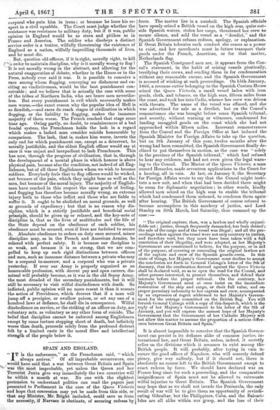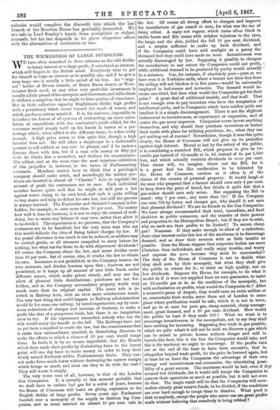SPAIN AND ENGLAND.
"TT is the unforeseen," as the Frenchman said, "which I always arrives." Of all improbable occurrences, one would have said that a war between Great Britain and Spain was the most improbable, yet unless the Queen and her Terrorist Junta give way immediately the two countries will be within a month at war. No one with the slightest pretension to understand politics can read the papers just presented to Parliament in the case of the Queen Victoria and hope that concession may yet be made from this side, or that any Minister, Mr. Bright included, could save us from the necessity, if Narvaez is obstinate, of securing redress by
force. The matter lies in a nutshell. The Spanish offleiaho have openly seized a British vessel on the high seas, quite out- side Spanish waters, stolen her cargo, threatened her crew to secure silence, and sold the vessel as a "derelict," and the Spanish Government refuses redress, apology, or explanation If Great Britain tolerates such conduct she ceases as a power to exist, and her merchants must in future transport their goods under the French, American, or for that matter, Netherlands flag.
The Spanish Coastguard men are, it appears from the Con- sul's statement, in the habit of seizing vessels piratically, terrifying their crews, and sending them in for condemnation without any reasonable excuse, and the Spanish Government is accused of winking at such proceedings. On 15th January, 1866, a revenue cutter belonging to the Spanish Custom House seized the Queen Victoria, a small vessel laden with iron goods, cloth, and tobacco, on the high seas, fifteen miles from
the coast, and took her into Cadiz, whence her crew was drives with threats. The name of the vessel was effaced, and she- was advertized for sale as a derelict, but on the Consul's remonstrance she was brought before some Spanish tribunal,. and secretly, without warning or witnesses, condemned for landing smuggled goods on the coast which she had not approached within fifteen miles. Incessant remonstrances from the Consul and the Foreign Office at last induced the
Spanish Minister for Foreign Affairs to take up the question,. but on 9th January of this year, twelve months after the wrong had been committed, the Spanish Government finally de- clined to put themselves in motion, as the case was "solely in the province of the Spanish tribunal," which had refused to hear any evidence, and had not even given the legal warn- ing to the Consul. The Master of the Queen Victoria, a man named Homedes, made seventeen applications to the Court for a hearing, all in vain. At last, on January 9, the Secretary for Foreign Affairs wrote to say that the Consul might insti- tute a new suit, and when that had been decided there might be room for diplomatic negotiation ; in other words, kindly allowed men seized on the high seas to enable the tribunal which had condemned them unheard, to condemn them again. after hearing. The British Government of course refused to , become accomplices in this mockery of justice, and Lord Stanley on 30th March, last Saturday, thus summed up the case :— "The original capture, then, was a lawless and wholly unjusti fable act ; justice, though frequently demanded, has been denied';: the sale of the cargo and of the vessel was illegal ; and all the pro- ceedings taken against the vessel were not only contrary to justice, and therefore void, but they must have been taken with a full conviction of their illegality, and were adopted, as her Majesty's Government are constrained to believe, for the purpose, or in aid of the purpose, of covering or concealing the original lawless act of the captain and crew of the Spanish guarda-costa. In this state of things, her Majesty's Government must decline to accept the conclusion set forth in General Calonge's letter of the 9th of January, that the confiscation decreed against the Queen Victoria shall be declared void, so as to open the road for the Consul, and other persons interested, to present themselves, and defend their interests before the proper tribunal. On the contrary, hen Majesty's Government must at once insist on the immediate. restoration of the ship and cargo, or their full value, and ots proper pecuniary indemnity to her captain and crew, accompanied by an expression of regret addressed to her Majesty's Govern- ment for the outrage committed on the British flag. You will furnish General Calonge with a copy of this despatch, which is the reply of her Majesty's Government to his letter of the 9th of January, and you will express the earnest hope of her Majesty's Government that the Government of her Catholic Majesty will not allow this matter to assume the proportion of a serious diffes- ence between Great Britain and Spain.'
It is almost impossible to conceive that the Spanish Govern- ment can persist in its defiance alike of common justice, in- ternational law, and Great Britain, unless, indeed, it secretly relies on the divisions which it assumes to exist among the British people. It will, probably, after trying in vain tia, secure the good offices of Napoleon, who will scarcely defend piracy, give way sullenly, but if it should not, there is absolutely no course left to the British Government except to exact redress by force. We should have declared war on France long since for such a proceeding, and the comparative insignificance of Spain must not be allowed to extenuate wilful injustice to Great Britain. The Spanish Government may hope that as we shall not invade the Peninsula, the only result of war will be to give them an opportunity of revindi- eating Gibraltar, but the Philippines, Cuba, and the Balearic. Isles are all alike within our grasp, and the loss of their
colonies would complete the discredit into which the last branch of the Bourbon House has gradually descended. We are safe in Lord Stanley's hands from precipitate or violent counsels, but his last despatch in its grave eloquence offers only the alternatives of restitution or war.































 Previous page
Previous page